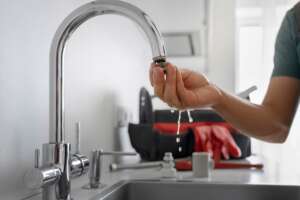Your whole house water filter works hard every day, keeping your water clean and free from contaminants. But like anything else, it doesn’t last forever. Over time, filters become saturated with the very impurities they remove, leading to lower water quality and system performance.
When it comes to the water your family drinks, bathes in, and cooks with, you don’t want to take any chances. If your water doesn’t taste right, your pressure has dropped, or your filter looks discolored, it might be time for a replacement. Knowing when to swap out an old filter keeps your water fresh and your home’s filtration system working as it should.
Understanding Your Whole House Water Filtration System
A whole home water filtration system is designed to provide clean, purified water to every tap in your home. It works by removing contaminants like sediment, chlorine, iron, and bacteria before the water reaches your sinks, showers, and appliances.
Most systems include multiple filtration stages, such as sediment pre-filters, activated carbon filters, and specialized media for treating specific water issues. But no matter how advanced your system is, every filter has a lifespan. Over time, the filter media gets clogged with debris and loses its effectiveness, making regular whole home water filter maintenance essential for good water quality.
Recognizing Decreased Water Quality and Pressure
When a whole house water filter reaches the end of its lifespan, one of the first things you’ll notice is a change in your water’s quality and flow. Here are three key warning signs:
- Your water tastes or smells off. If your water suddenly has a metallic, musty, or chlorine-like smell, your filter may no longer be effectively removing contaminants.
- You experience a drop in water pressure. A clogged filter restricts water flow, which means weak showers, slow-filling sinks, and poor appliance performance.
- You see sediment or particles in your water. A worn-out filter might not trap dirt and debris as well as it should, allowing visible particles to make their way into your water.
Drinking water that’s properly filtered is important for your health. Learn more about safe drinking water and how filtration plays a role in it.
Water Filter Visual and Maintenance Timeline Indicators
If your water seems fine but you’re still unsure whether your whole house water filters need changing, do a quick visual check.
- Your filter media looks discolored or clogged. Many filters are white or light-colored when new. If yours is dark brown, orange, or covered in debris, it’s time for a replacement.
- You’ve exceeded the recommended replacement time. Most filters should be changed every 6 to 12 months, but this varies based on water quality and usage. Check your system’s manual to see if you’re overdue.
Not sure when or how to change your whole house water filter? Professional maintenance can help. Here’s why investing in water filtration service can save you time and hassle.
Filtration System Performance and Water Quality Issues
 Even if you don’t notice major changes in taste or pressure, underlying issues with your whole home water filtration system might be affecting your water quality.
Even if you don’t notice major changes in taste or pressure, underlying issues with your whole home water filtration system might be affecting your water quality.
- Your plumbing is acting up. If you’re experiencing unusual buildup in your pipes or fixtures, your filter might not be doing its job properly.
- Your water issues keep coming back. If problems like staining, odor, or hard water persist even after treatment, your filter may be ineffective or defective. (Wondering, “Can water filters be defective?”—yes, they can!)
The type of water you have can also impact how often you need a filters replacement. Homes with City water may need more frequent filter changes due to chlorine and chemical buildup, while well water users often deal with sediment and bacteria. If your filter isn’t reducing PFAs in water effectively, it’s a strong indicator that a change is overdue.
How to Choose and Maintain Your New Whole House Water Filter
When replacing your whole house water filter system, you’ll want to choose a filter that matches your home’s specific needs. Consider factors like:
- Your water source: Do you have city water, well water, or a mix of both?
- Your biggest water concerns: Are you dealing with hard water, chlorine, bacteria, or heavy metals?
- Your household size and water usage: More people = more water usage = more frequent filter changes.
- Your budget: Some systems require more frequent filter changes than others, so plan accordingly.
To keep your whole home water filtration system running efficiently:
✔ Check your filter regularly for signs of buildup or discoloration.
✔ Follow the manufacturer’s recommended replacement schedule.
✔ Invest in a professional water analysis to confirm your filter is meeting your needs.
✔ Consider a maintenance plan to extend the life of your system.
Need expert help? Learn about water filtration and how Metro Water Filter of the South can help you find the right system. If you’re ready to contact a whole home water filter expert, reach out today!
Clean Water for Your Entire Home
A whole house water filter is one of the best ways to provide clean, safe water for your family. But just like any hardworking system, it needs regular maintenance and timely replacement to keep working effectively.
By watching for the seven signs we covered—like changes in taste, low pressure, and overdue maintenance—you can stay ahead of filter issues and keep your whole house water filtration system running at its best. If you’re unsure whether it’s time for a replacement, Metro Water Filter of the South is here to help. Contact us today for a free water test and expert advice!



